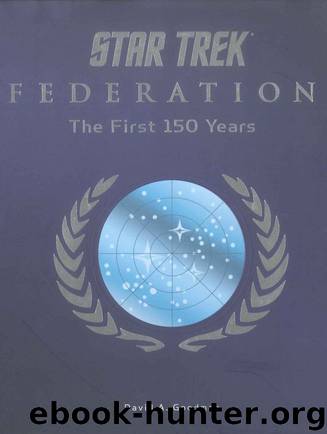Star Trek Federation: The First 150 Years by David A. Goodman

Author:David A. Goodman [Goodman, David A.]
Language: eng
Format: epub
ISBN: 9781781169155
Publisher: Titan Books
Published: 2013-10-14T16:00:00+00:00
THE UNITED FEDERATION OF PLANETS
During the negotiations over the charter, Vanderbilt began to see the potential for an even greater opportunity. His vision would lead quickly to a cascade of events that would change history.
At one of the many bumps in the road during discussions, Vanderbilt found himself in a room with the delegates from Vulcan, Andoria, Tellar, and the Earth colony on Proxima Centauri.
AUTHOR’S NOTE: The Proxima Colony, or Alpha Centauri as it was more colloquially know, had become a thriving world in the century since Zefram Cochrane had helped found, and then terraform, the planet. They peacefully declared their independence twenty years before the founding of the Coalition.
Natha Kell, the delegate from Tellar, didn’t just want the military alliance to help defend the member planets, he also wanted help maintaining his world’s fleet. Ambassador Sarahd of Andoria had the same motive, but certainly wasn’t going to let Tellar get help building new ships from the Coalition.
Vanderbilt understood that both these worlds devoted many of their resources to maintaining their fleets and as a result, their homeworlds often faced shortages of food and other resources. And Vanderbilt knew that they still worried that one of their old adversaries, if given help with their military, might decide to move against them in the future.
But Vanderbilt saw a diplomatic compromise that could reshape the quadrant. “While I was listening to [Andorian Ambassador] Sarahd and [Tellarite Ambassador] Kell shouting at each other,” Vanderbilt wrote in The Founding, his own memoir on the Federations origins, “I could see the fear in their eyes of what the others might do. That was what drove them, and me. I thought if all these world governments were folded into one body, no one world could make a move on its own. It would take the fear away.”
And there would be huge advantages: resources could be equally distributed, diplomatic moves would be voted on, and all the fleets of these worlds would be under one command. It would provide the ultimate security. By limiting it to the most powerful worlds in the Coalition, combining their spheres of influence into one large territory, other governments could and would lobby to join. It was a truly visionary idea, and, “Once it was in my head,” Vanderbilt wrote, “I couldn’t let it go, even if it made me a laughingstock.”
He brought the idea to Samuels. The men later recounted that at this meeting Samuels was initially reluctant. “In my experience as a politician,” Samuels told Vanderbilt, “when someone tries to convince you to share power, it generally means giving up power.” But he had called this second convention to provide security for Earth, and Vanderbilt’s proposal would provide this security much more efficiently.
“The one thing I did know was that I was constantly surprised how cooperative these governments had become,” Samuels said, “and if there was ever a moment for Earth to try to make this happen, it was then.” He brought the proposal to the United Earth Council, which gave the go-ahead for Vanderbilt to bring it to the other four governments.
Download
This site does not store any files on its server. We only index and link to content provided by other sites. Please contact the content providers to delete copyright contents if any and email us, we'll remove relevant links or contents immediately.
| Direction & Production | Genres |
| Guides & Reviews | History & Criticism |
| Reference | Screenwriting |
| Shows |
Robin by Dave Itzkoff(2436)
Head of Drama by Sydney Newman(2296)
I'm Judging You by Luvvie Ajayi(2202)
The Paranormal 13 (13 free books featuring witches, vampires, werewolves, mermaids, psychics, Loki, time travel and more!) by unknow(2084)
Ten by Gretchen McNeil(1884)
Single State of Mind by Andi Dorfman(1809)
#MurderTrending by Gretchen McNeil(1656)
Key to the Sacred Pattern: The Untold Story of Rennes-le-Chateau by Henry Lincoln(1624)
Merv by Merv Griffin(1610)
Most Talkative by Andy Cohen(1588)
This Is Just My Face by Gabourey Sidibe(1467)
Notes from the Upside Down by Guy Adams(1467)
The Hunger Games: Official Illustrated Movie Companion by Egan Kate(1425)
Springfield Confidential by Mike Reiss(1412)
Binging with Babish by Andrew Rea(1409)
Jamie Oliver by Stafford Hildred(1387)
The TV Writer's Workbook: A Creative Approach To Television Scripts by Ellen Sandler(1347)
Clarkson--Look Who's Back by Gwen Russell(1342)
Blue Planet II by James Honeyborne & Mark Brownlow(1282)
